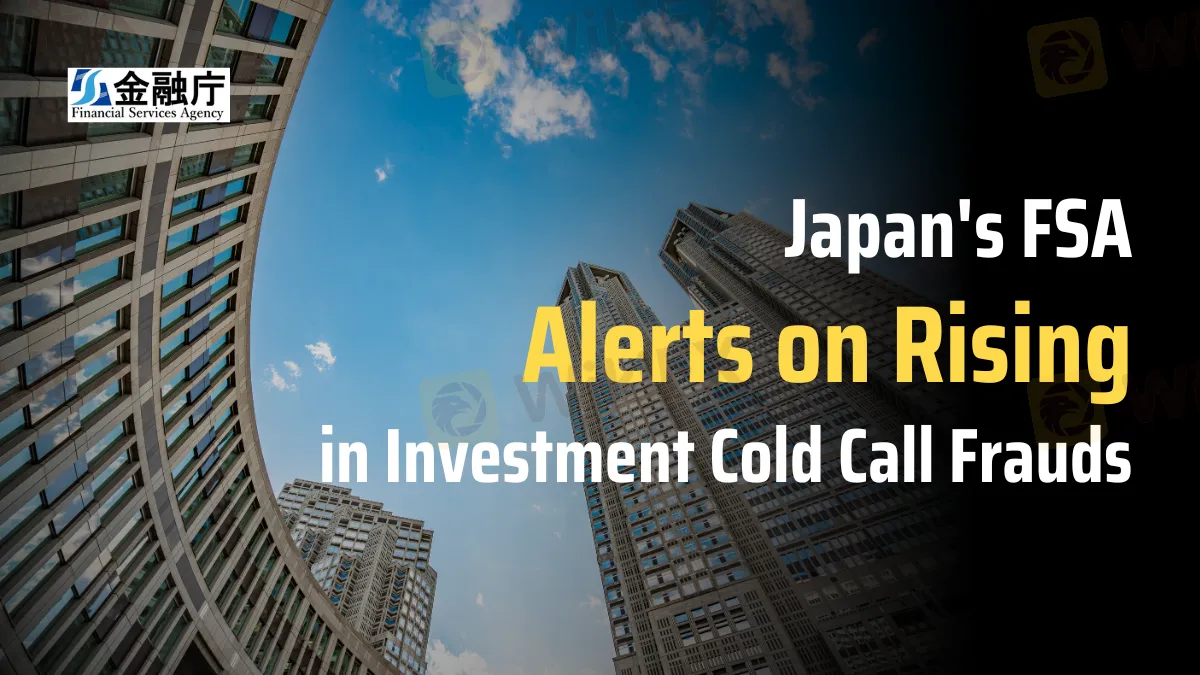简体中文
繁體中文
English
Pусский
日本語
ภาษาไทย
Tiếng Việt
Bahasa Indonesia
Español
हिन्दी
Filippiiniläinen
Français
Deutsch
Português
Türkçe
한국어
العربية
Japan's FSA Alerts on Rising in Investment Cold Call Frauds
Abstract:Japan's Financial Services Agency (FSA) issued a warning about rising fraudulent investment schemes through cold calls. Investors are advised to verify firms.

The Financial Services Agency of Japan (FSA) has issued a warning about the rise in cold calling-related investment fraud. This warning is intended for fraudulent, emailed, or faxed phony organizations that act as legitimate financial institutions and illegally solicit cash from investors.
As to the FSA research, these scammers often pose as reputable asset management or brokerage businesses to lure investors into purchasing high-risk financial products or securities. These operators often leave after they have convinced people to pay, leaving investors with large losses and no real securities.
To counteract this dishonest behavior, the FSA emphasized how crucial it is to confirm the registration or licensing status of any organization providing investment options. These cold callers lack the legal registration that is necessary for legitimate solicitation in Japan's securities industry. By giving fictitious addresses and claiming to be based in nations other than those of their target victims, these fraudulent businesses often make monitoring efforts more difficult.

The problem has drawn attention from across the world as a result of collaboration with foreign authorities and the disclosure of reports by worldwide investors. The Financial Instrument and Exchange Act of Japan does not register any of these non-authorized businesses, thus, the FSA has reacted by making a public list of them. This list is part of an ongoing effort to prevent future fraud and to encourage investors to check it out before making a financial commitment.
Furthermore, the February 2002 International Organization of Securities Commissions (IOSCO) notice and the FSA's advice are in line with each other. The Indian Oil and Gas Regulatory Commission (IOSCO) has already issued a warning against making investment choices based only on cold calls, especially when the cold calls offer inflated returns or unregulated “guaranteed” earnings.
The FSA advises investors to exercise caution and thorough due diligence on any investment proposals as part of its responsibility to safeguard consumers. The official FSA website includes a list of non-registered businesses as well as detailed guidance on detecting and preventing investment fraud. Internationally connected resources are added to this data to help investors safeguard their financial interests and make well-informed judgments.
The emergence of sophisticated fraudulent schemes continues to pose serious dangers to investors, and this updated warning emphasizes the persistent problems in the global financial environment. To improve regulatory measures and guarantee a safer investment environment for all, the FSA is still dedicated to collaborating with international agencies.

Disclaimer:
The views in this article only represent the author's personal views, and do not constitute investment advice on this platform. This platform does not guarantee the accuracy, completeness and timeliness of the information in the article, and will not be liable for any loss caused by the use of or reliance on the information in the article.
Read more

CySEC Launches Redesigned Website Packed with New Features
CySEC unveils a redesigned website with advanced search tools, centralized resources, and a news section, enhancing accessibility, transparency, and user experience.

Webull Canada Expands Options Trading to TFSAs and RRSPs
Webull Canada launches options trading for TFSAs and RRSPs, offering Canadian investors tax-free growth and retirement savings optimization opportunities.

Pros and Cons of Choosing Unregulated Forex Brokers
Discover the pros and cons of unregulated forex brokers, explore risks, benefits, and key features, and learn how to evaluate their credibility with the WikiFX app.

5 Questions to Ask Yourself Before Taking a Trade
Before executing any trade, traders should pause and ask themselves critical questions to ensure they are making rational and well-informed decisions. Here are five questions to help you reflect on your strategy, manage risk, and control emotions before entering the market.
WikiFX Broker
Latest News
ASIC Sues HSBC Australia Over $23M Scam Failures
Trader Turns $27 Into $52M With PEPE Coin, Breaking Records
Singaporean Arrested in Thailand for 22.4 Million Baht Crypto Scam
Elderly Trader Loses RM2.1M in WhatsApp Forex Scam
Spotware Unveils cTrader Store, Global Marketplace for Algo Creators
Gigamax Scam: Tracking Key Suspects in RM7 Million Crypto Fraud
WikiFX Review: Is IQ Option trustworthy?
5 Questions to Ask Yourself Before Taking a Trade
FCA Seeks Input to Shape UK Crypto Market Regulations
Understanding the Impact of Interest Rate Changes on Forex Markets
Currency Calculator


